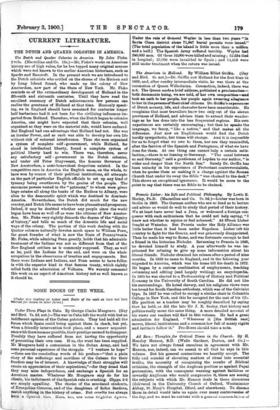CURRENT LITERATURE.
THE DUTCH AND QUAKER COLONIES IN AMERICA.
The Dutch and Quaker Colonies in America. By John Fiske. 2 vols. (Macmillan and Co. 16s.) —Mr, Fiske's works on American history are of high value, for he has tapped many original sources which were not known to the earlier American historians, each as Sparks and Bancroft. In the present work we are introduced to the Dutch colonists who settled on the shores of the Hudson and by Long Island Sound, who made up the colony of New Amsterdam, now part of the State of New York. Mr. Fiske reminds us of the extraordinary development of Holland in the fifteenth and sixteenth centuries. Until they have read the excellent summary of Dutch achievements few persons can realise the greatness of Holland at that time. Humanly speak- ing, we in England should have remained for centuries longer half barbarians had it not been for the civilising influences im- parted from Holland. Therefore, when the Dutch began to colonise America, one might have expected that their colonies, well organised as they were on the material side, would have endured. But England had one advantage that Holland had not. She was an insular Power, and as such was able to develop her own life without risk of external interference. Thus she soon organised a system of oomplete self - government, while Holland, far ahead in intellectual liberty, found a complete system of political liberty hard to win. There was, therefore, never any satisfactory self - government in the Dutch colonies, and under old Peter Stuyvesant, the famous Governor of New Amsterdam, a semi-benevolent despotism existed. In the competitive race in America the English seem, on the whole, to have won by reason of their political institutions, all attempts on the part of particular English officials to set up any kind of tyranny being overthrown by the genius of the people. The enormous powers vested in the " patroons," to whom were given huge estates all along the banks of the Hudson to Albany, were alien to the democratic spirit which was destined to dominate America. Nevertheless, the Dutch did much for the new country, and Dutch life seems to have been pleasant and prosperous. Indeed, it may be doubted whether any people since the world began have been so well off as were the citizens of New Amster- dam. Mr. Fiske very rightly discards the dogma of the "dignity of history," and tells us much of the domestic life and social ways of the colony. The portion of this work dealing with the Quaker colonies naturally devotes much space to William Penn, the great founder of what is now the State of Pennsylvania Mr. Fiske, while admiring Penn greatly, holds that his admirable treatment of the Indians was not so different from that of the New England settlers as is commonly supposed. They, as well as he, paid the Indians for the soil, and were on the whole scrupulous in the observance of treaties and engagements. But there were Indians and Indians, and Penn seems to have fallen in with the superior kind in that famous treaty, which rightly called forth the admiration of Voltaire. We warmly commend this work on an aspect of American history not so well known as it should be.






































 Previous page
Previous page